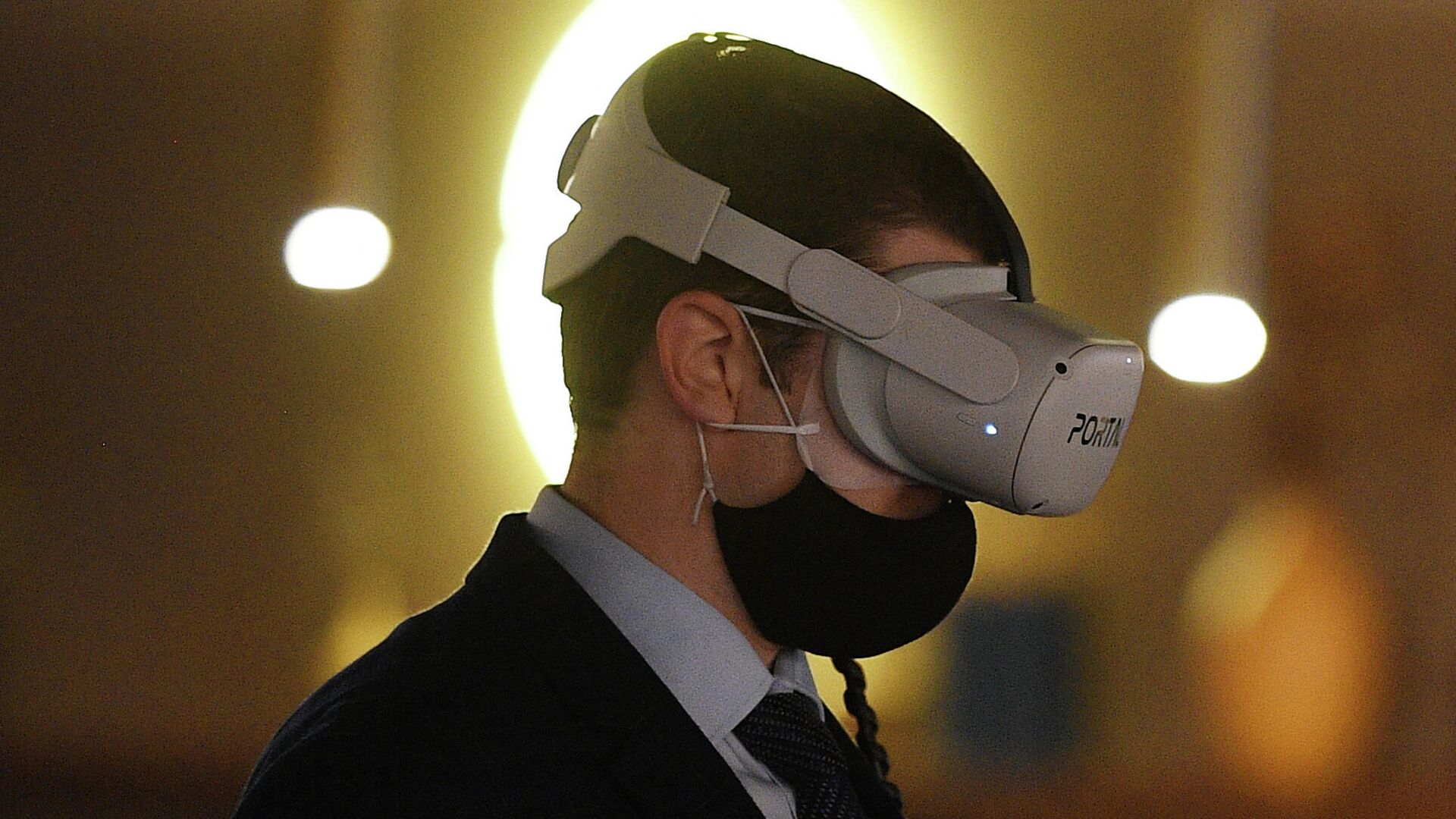https://sputnikglobe.com/20221014/metas-new-vr-device-tracks-your-face-what-does-that-mean-for-privacy-1101829175.html
Meta’s New VR Device Tracks Your Face, What Does That Mean for Privacy?
Meta’s New VR Device Tracks Your Face, What Does That Mean for Privacy?
Sputnik International
Meta,* then called Facebook, entered the Virtual Reality space when it purchased Oculus in 2014. It soon started working on building the “metaverse” and... 14.10.2022, Sputnik International
2022-10-14T00:16+0000
2022-10-14T00:16+0000
2022-11-03T18:23+0000
science & tech
meta
vr
data privacy
internet privacy
digital privacy
privacy
facebook
https://cdn1.img.sputnikglobe.com/img/07e5/0b/02/1090419664_0:122:1930:1208_1920x0_80_0_0_8807abae7666b1182bd52c59fe3b849e.jpg
At its Meta Connect event on Tuesday, the company revealed the new Meta Quest Pro, an enterprise-level device that is more powerful, thinner, lighter, and with improved augmented reality capabilities compared to its current consumer-focused Meta Quest 2 device.As it is an enterprise device, aimed at companies and VR enthusiasts with extremely deep pockets, it will launch for $1499 and will be released at the end of this month. Significantly, it includes face and eye tracking.It uses five inward-facing cameras to record the user’s face, allowing the user's avatar to mimic their actions. They can smile or frown, raise their eyebrows, furrow their brow, and just generally reflect what users do in the real world onto their virtual avatar. It will also allow for more detailed environments through foveated rendering, tracking the user’s eyes and rendering what is in the center of the user’s vision, while rendering everything else at a lower resolution, not unlike how peripheral vision works in our real eyes. Meta CEO Mark Zuckerberg says face-tracking avatars will be essential for VR to become part of the workplace.The demos on display at Meta Connect 2022 were impressive and a massive leap from their current method of listening to the user’s voice to approximate mouth movements, but some are worried about potential privacy concerns.While Meta says that the images the device captures are stored locally on the device and deleted after use, that is not enough to assuage the fears of many. Facial identification has been at the forefront of personal privacy in the digital age. In November 2021, Meta announced that Facebook would delete the facial recognition data it had gathered and used to automatically tag people in pictures.Still, the data potentially gathered from the Meta Quest Pro could be used to enhance attempts to use facial recognition to determine a user’s emotion, a longtime goal of advertisers and tech companies like Amazon, who have attempted that in the past.Meta has also been experimenting with ads inside of VR, something that angered its consumer base last year. With face and eye tracking, Meta could tell how long a user looks at an ad and, potentially, what their reaction is to it. In one way, this is not unlike how websites can track how long your mouse cursor will linger over a part of a page, only even more personal and invasive. And while the images are deleted under Meta’s current privacy policy, it also states that the insights from those images are processed and stored on Meta’s servers. Additionally, that data can be accessed by companies outside of Meta through its new Movement SDK so that they can animate avatars in their games and applications.Furthermore, the Meta Quest Pro, like the Meta Quest 2 and its predecessor the Oculus Quest, also has outward-facing cameras. To build a play space, the devices map out the user’s room, potentially giving Meta and any other company that gets access to that data knowledge of the size and shape of a user’s room, or multiple rooms if the user uses the device in several places, which is valuable data for advertisers.Meta has been attempting to shed its reputation as a company with bad privacy practices, something that was exacerbated in the Cambridge Analytica data scandal in 2018. Many believe that PR shift was behind the company’s aforementioned move to delete its facial recognition data, but remain unconvinced that Meta, either through incompetence or malfeasance, is capable of properly securing user data.It is difficult to explain to someone who hasn’t put on a headset how personal virtual reality can feel at times. Still, it is safe to say that more expressive avatars will go a long way towards building interconnectedness between people in virtual reality, but it also has the potential for advertisers to use those same emotions against us.Kavya Pearlman is the founder of the XR Safety Initiative, which advises businesses and governments about safety and ethics in the metaverse, and is also the creator of Second Life, an MMO game that predates modern virtual reality. She is also concerned about advertising in virtual reality. “My background suggests that we are on a very dangerous path,” says Pearlman. “And if we aren’t careful our autonomy, free will, and agency are at risk.”*Facebook and its parent company Meta are banned in Russia as extremist, terrorist organizations.
https://sputnikglobe.com/20221011/russia-adds-meta-to-list-of-terrorist-organizations-1101719501.html
https://sputnikglobe.com/20220827/meta-has-reached-a-preliminary-settlement-in-the-cambridge-analytica-lawsuit-1100073056.html
Sputnik International
feedback@sputniknews.com
+74956456601
MIA „Rossiya Segodnya“
2022
News
en_EN
Sputnik International
feedback@sputniknews.com
+74956456601
MIA „Rossiya Segodnya“
Sputnik International
feedback@sputniknews.com
+74956456601
MIA „Rossiya Segodnya“
science & tech, meta, vr, data privacy, internet privacy, digital privacy, privacy, facebook
science & tech, meta, vr, data privacy, internet privacy, digital privacy, privacy, facebook
Meta’s New VR Device Tracks Your Face, What Does That Mean for Privacy?
00:16 GMT 14.10.2022 (Updated: 18:23 GMT 03.11.2022) Meta,* then called Facebook, entered the Virtual Reality space when it purchased Oculus in 2014. It soon started working on building the “metaverse” and renamed its company to reflect that.
At its Meta Connect event on Tuesday,
the company revealed the new Meta Quest Pro, an enterprise-level device that is more powerful, thinner, lighter, and with improved augmented reality capabilities compared to its current consumer-focused Meta Quest 2 device.
As it is an enterprise device, aimed at companies and VR enthusiasts with extremely deep pockets, it will launch for $1499 and will be released at the end of this month. Significantly, it includes face and eye tracking.
It uses five inward-facing cameras to record the user’s face, allowing the user's avatar to mimic their actions. They can smile or frown, raise their eyebrows, furrow their brow, and just generally reflect what users do in the real world onto their virtual avatar. It will also allow for more detailed environments through foveated rendering, tracking the user’s eyes and rendering what is in the center of the user’s vision, while rendering everything else at a lower resolution, not unlike how peripheral vision works in our real eyes. Meta CEO Mark Zuckerberg says face-tracking avatars will be essential for VR to become part of the workplace.

11 October 2022, 11:49 GMT
The demos on display at Meta Connect 2022 were impressive and a massive leap from their current method of listening to the user’s voice to approximate mouth movements, but some are worried about potential privacy concerns.
While Meta says that the images the device captures are stored locally on the device and deleted after use, that is not enough to assuage the fears of many. Facial identification has been at the forefront of personal privacy in the digital age. In November 2021, Meta announced that Facebook would delete the facial recognition data it had gathered and used to automatically tag people in pictures.
Still, the data potentially gathered from the Meta Quest Pro could be used to enhance attempts to use facial recognition to determine a user’s emotion, a longtime goal of advertisers and tech companies like Amazon, who have attempted that in the past.
Meta has also been experimenting with ads inside of VR, something that
angered its consumer base last year. With face and eye tracking, Meta could tell how long a user looks at an ad and, potentially, what their reaction is to it. In one way, this is not unlike how websites can track how long your mouse cursor will linger over a part of a page, only even more personal and invasive. And while the images are deleted under Meta’s current privacy policy, it also states that the insights from those images are processed and stored on Meta’s servers. Additionally, that data can be accessed by companies outside of Meta through its new Movement SDK so that they can animate avatars in their games and applications.

27 August 2022, 20:49 GMT
Furthermore, the Meta Quest Pro, like the Meta Quest 2 and its predecessor the Oculus Quest, also has outward-facing cameras. To build a play space, the devices map out the user’s room, potentially giving Meta and any other company that gets access to that data knowledge of the size and shape of a user’s room, or multiple rooms if the user uses the device in several places, which is valuable data for advertisers.
Avi Bar-Zeev, a virtual and augmented reality consultant who worked on Microsoft’s HoloLens headset, told Wired that Meta’s headsets make him uneasy over privacy issues. “My concern is not that we’re going to be served a bunch of ads that we hate,” Bar-Zeev says. “My concern is that they’re going to know so much about us that they’re going to serve us a bunch of ads that we love, and we’re not even going to know that they’re ads.”
Meta has been attempting to shed its reputation as a company with bad privacy practices, something that was exacerbated in the
Cambridge Analytica data scandal in 2018. Many believe that PR shift was behind the company’s aforementioned move to delete its facial recognition data, but remain unconvinced that Meta, either through incompetence or malfeasance, is capable of properly securing user data.
It is difficult to explain to someone who hasn’t put on a headset how personal virtual reality can feel at times. Still, it is safe to say that more expressive avatars will go a long way towards building interconnectedness between people in virtual reality, but it also has the potential for advertisers to use those same emotions against us.
Kavya Pearlman is the founder of the XR Safety Initiative, which advises businesses and governments about safety and ethics in the metaverse, and is also the creator of Second Life, an MMO game that predates modern virtual reality. She is also concerned about advertising in virtual reality. “My background suggests that we are on a very dangerous path,” says Pearlman. “And if we aren’t careful our autonomy, free will, and agency are at risk.”
*Facebook and its parent company Meta are banned in Russia as extremist, terrorist organizations.



